If you’re planning to launch or upgrade your eCommerce website, selecting the right platform is crucial to the success of your business. Maybe you’ve looked at different options and wondered, “Is Magento the best?”.
In our updated Magento guide for beginners, we’ll explain why Magento remains a leading choice in 2024 for businesses of all sizes. From Magento Open Source to Adobe Commerce, we’ll dive into what makes Magento the best for eCommerce—and why it continues to outperform competitors like Shopify and BigCommerce.

Editor’s Note [21st November 2024]: Twelve years on and our 2012 article has been updated to reflect the latest advancements in Magento and eCommerce trends for 2024. While some original content remains relevant, we’ve added new insights on Magento Open Source, Adobe Commerce, Hyvä Themes, and Mage-OS to ensure the information is current and valuable for today’s businesses.
For those of you who prefer a visual guide, we’ve included an infographic below that breaks down Magento’s key features and benefits. While it’s a bit dated, many of the points are still highly relevant for understanding why Magento is the best choice for eCommerce. Click below to view the full infographic and see how Magento stacks up against other platforms.
Is Magento the best eCommerce platform for online retail? A Magento guide for beninners
Why Choose Magento for Your eCommerce Website?
If you’re building an online store, one of the first decisions you’ll face is which eCommerce platform to use. With so many options available today, from Shopify to WooCommerce and everything in between, it’s easy to feel overwhelmed. But one name consistently stands out among the rest: Magento!
This Magento guide for beginners is designed to give you a clear understanding of why Magento remains one of the most popular eCommerce platforms on the market.
Whether you’re completely new to eCommerce or looking for ways to get the most out of your existing Magento store, you’ll find practical tips and insights here to help you make the right decisions. From its flexibility and customisability to its robust features that cater to businesses of all sizes, there’s a reason Magento has earned its reputation as one of the best eCommerce platforms around.
So, if you’re ready to explore what makes Magento so powerful and how you can create an attractive, user-friendly online store, keep reading. In the next section, we’ll talk about designing your Magento website and how to make it work for both your business and your customers.
A Magento Guide for Beginners
1 – Designing your Magento website
Magento boasts excellent functionality out of the box but it’ll take more than that to win customers over.
In order to keep visitors on your site long enough to use its features and explore your product pages, you will need an attractive Magento design.
One of the easiest ways to customise the look of your Magento eCommerce store is with Magento themes.
These can be downloaded for free (or for a small cost) from the Adobe Commerce Marketplace, as well as various other websites, such as Theme Forest.
All themes these days are responsive, meaning they are optimised for all devices, from PCs to smartphones. They’ll improve your Magento store’s user experience and also help to increase its search rankings too by providing an optimal user experience.
It can be difficult to get started with a Magento design, especially if you have little experience, which is why we have created a Magento Design Guide to give you a helping hand:
In the above guide, you will find all the tips and information you need to build an attractive Magento website. If you need any other help, you can always get in touch with our team of experienced Magento designers.
2 – Marketing your Magento website
Once you’ve built a great-looking, well-functioning website using Magento your chosen theme and extensions, you will need to think about how you are going to promote your eCommerce brand.
There are plenty of different marketing techniques you can incorporate into your digital marketing strategy for Magento.
Search Engine Optimisation
One of the most important is eCommerce SEO.
If your Magento site can’t be found through search engines, you’re going to struggle to get organic traffic to your website and therefore sales. This is why you need to optimise your Magento site for search engine friendly.
Thankfully, Magento has great SEO features and makes optimisation easy. There is a wide range of Magento extensions available at the Adobe Commerce Marketplace to help enhance the built-in features provided by Magento. For example:
- Rich Snippets & Schema – Add advanced structured data for better visibility in search results.
- Automated Meta Tags – Generate optimised meta titles and descriptions automatically.
- XML Sitemap Improvements – Create dynamic, customisable sitemaps for better crawling.
- SEO-Friendly URLs – Fix duplicate URLs and optimize slugs for search engines.
- Canonical Tag Management – Avoid duplicate content issues with automated canonical tags.
Popular Magento SEO extensions like Mageplaza SEO or Amasty’s SEO Toolkit can help businesses rank higher in search engines by optimizing metadata, URLs, and even schema markup.
You can also follow our SEO tips, to help boost your search rankings:
In our latest guide, we even go into how User Behaviour Analysis (UBA) impacts SEO.
Social Media, Affiliate and Email Marketing
If you are already trading, you’re likely to already be using social media to promote your business but if you need a little extra boost you may want to think about affiliate marketing and email marketing too.
Affiliate marketing is great for building professional relationships with influencers and involves paying them a small percentage of sales for their help in marketing your products.
Email marketing allows you to engage with your customers, drive traffic to your site and increase your conversions. It’s still one of the most powerful marketing methods on the planet.
We recommend integrating different forms of marketing under a single strategy to get the best overall exposure to the market and ROI.
Is Magento the best free eCommerce platform?
Magento is one of the most widely used open-source eCommerce platforms, built with PHP to deliver flexibility and power for online businesses. But why Magento? and is Magento the best? What sets it apart from other platforms like Shopify, WooCommerce, or BigCommerce?
To help you decide, we’ve compiled a list of key reasons that show why Magento is the best choice for creating and growing an eCommerce store below.
Top features that make Magento the best for eCommerce.
It is not just a coincidence that so many of the world’s leading eCommerce brands use Magento to power their online stores. Many are drawn to Magento for its powerful out-of-the-box features, which other competitors are still yet to beat.
Superior modular architecture
One of Magento’s key features is its superior modular architecture. The platform has been designed to allow for extensive customisations to both the frontend (in the form of layouts and themes) and backend (re-writes, modules etc.) This means eCommerce merchants can customise the look and functionality of their web stores as much as they wish too.
Inventory management
Magento makes it very easy for merchants to upload their products, write descriptions, add tags and categorise their products. Any possible inventory management action you need to take can be done in Magento.
Selling products
Not only does Magento make it easy for you to upload and manage products but also to sell them. With upselling and cross-selling features, as well as things like coupon creation, you have all the tools you need to encourage customers to spend more on your web store.
Order management
Magento makes order processing and management simple. By allowing you to review, change and track orders, you can get a full overview of the sales coming in and the products that need to go out to your customers.
Reporting
One of Magento’s key strengths is its reporting features. From your admin panel, you will be able to create and view detailed analytics and reports that give you a clear idea of everything from your top-selling products to how customers interact with your website. The information you curate in Magento can be used to help you make better-informed business decisions in the future.
SEO
With great SEO features out-of-the-box, including search engine-friendly URLs, Google Sitemap generation and customisable meta-information for products, categories and content pages, you have everything you need to optimise your website and improve its search engine rankings.
Multi-store management
Can you see yourself creating different versions of your eCommerce store in the future? If so, you’ll be pleased to hear that Magento offers multi-store management out of the box. Merchants can create multiple versions of their stores in different languages and currencies and manage them from a single admin panel.
Responsive design
The latest version of Magento Community is fully responsive. This means you can benefit from offering customers a seamless shopping experience on your site, no matter what device they are using. You will also benefit from elevated mobile search rankings, thanks to Google’s latest algorithm.
Magento’s support ecosystem: community and developers
Unless you pay to use Adobe Commerce (which used to be Magento Enterprise), you won’t receive any support from the official Magento (Adobe) team.
However, that doesn’t mean you’ve got to go at it alone. One of the things that makes Magento the best free eCommerce platform is it’s open-source with an avid community of developers and users available to support you.
Based all over the world, they voluntarily provide support for Magento users, create patches and make the software the best it can possibly be.
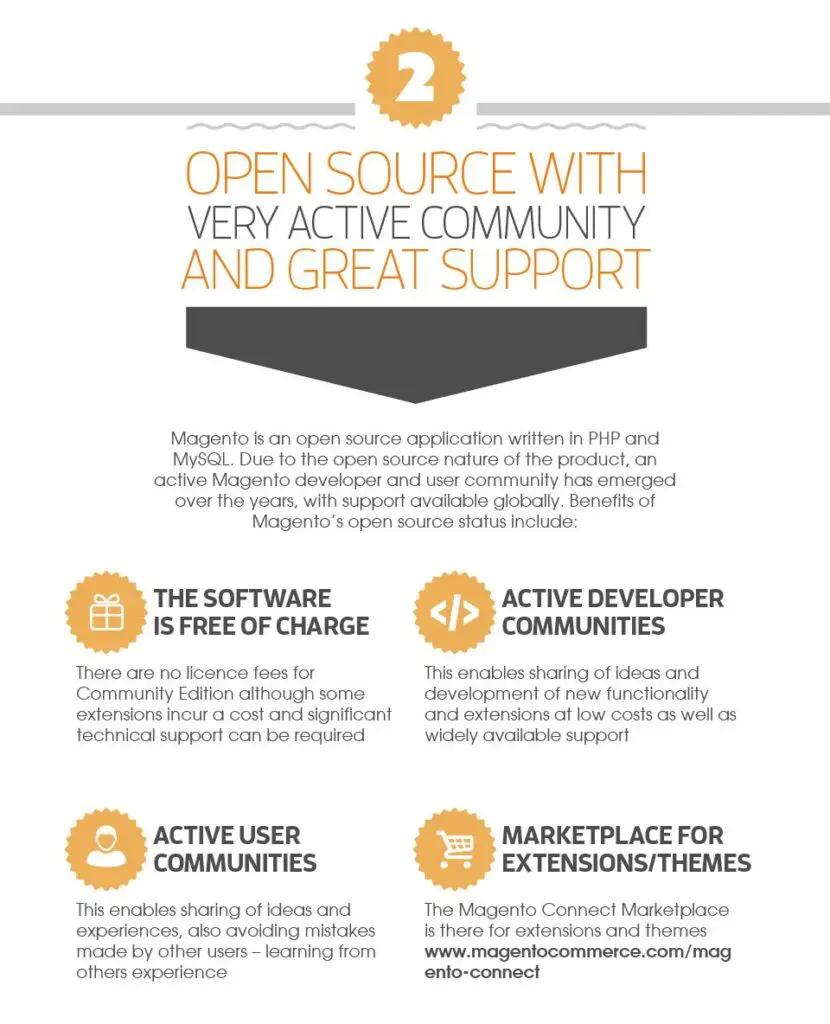
If you have a question about Magento or you come across a bug, you can simply head to the forums and someone from the Magento community will be on hand to provide you with the assistance you require.
SEO-friendly features built in
Magento is designed with powerful SEO-friendly features right out of the box, making it an ideal choice for businesses looking to improve their online visibility.
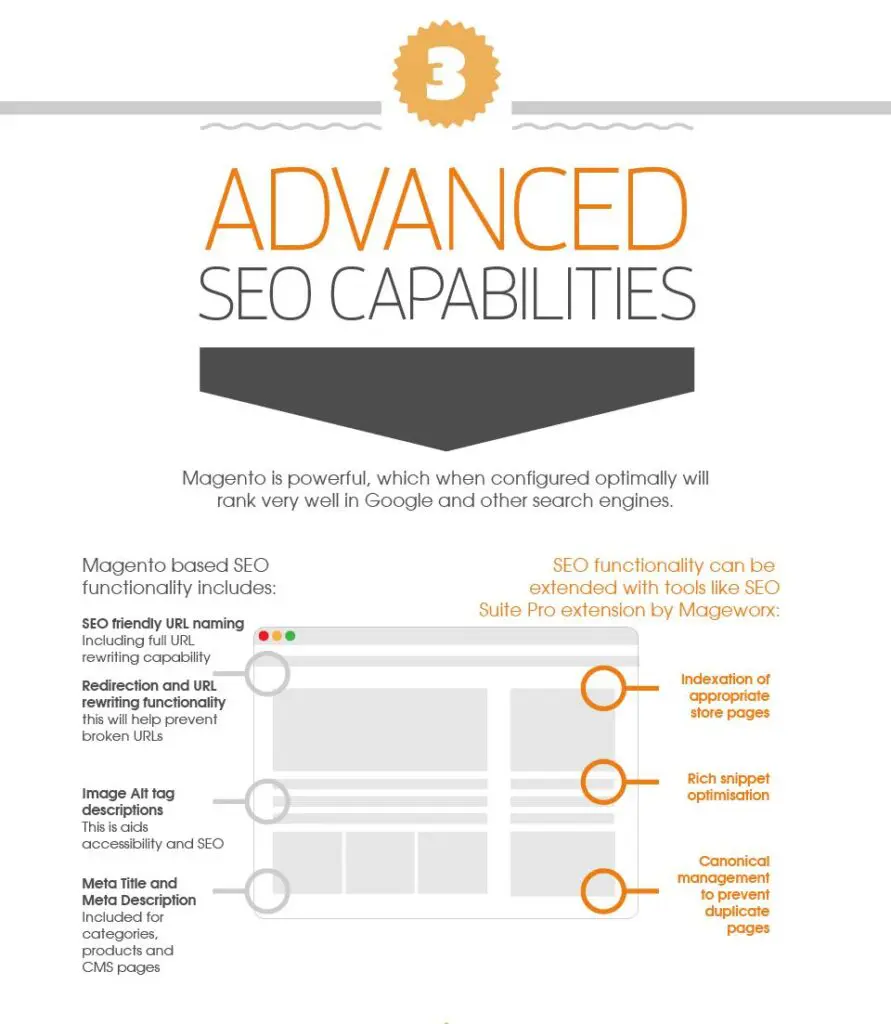
These tools ensure that your store performs well in search engine rankings while driving more organic traffic to your site.
-
Search Engine-Friendly URLs
Magento automatically generates clean, SEO-friendly URLs for your product and category pages, helping search engines easily index your content. -
Customisable Metadata
With Magento, you can customize meta titles, descriptions, and keywords for every product, category, and CMS page, ensuring your site is optimised for relevant search terms. -
Google Sitemap Generation
Magento simplifies sitemap creation, automatically generating Google-compliant sitemaps to improve your site’s crawlability and indexing. -
Built-In Structured Data
Out-of-the-box support for structured data ensures that your site is eligible for rich snippets, showcasing product ratings, prices, and stock availability directly in search results.
With these features and more, Magento offers everything you need to optimise your eCommerce website, improve its search rankings, and attract more customers organically.
Thousands of extensions to enhance functionality
In addition to having the best out-of-the-box features for an eCommerce platform, Magento also boasts the world’s largest eCommerce application marketplaces containing add-on extensions.

There are thousands of different modules (extensions) available, each of which are grouped into the following categories:
- Customer experience
- Site management
- Integrations
- Marketing
- Utilities
- Themes
Magento modules are designed to help merchants boost the functionality of their eCommerce stores by extending the core code.
Some Magento modules are free to download and use, whereas others need to be paid for.
Read our article on how to install a Magento extension for more information about them:
Whilst there are thousands of Magento modules available, there’s still a chance that you won’t be able to find exactly what you’re looking for.
The good news is that an experienced Magento developer will be able to create a custom module for you. Magento developers know all the ins and outs of the platform and are therefore able to create a bespoke module that will perfectly integrate with the architecture and provide the functionality you require.
Secure and scaleable architecture
Unlike other eCommerce platforms out there, Magento meets the needs of all businesses.
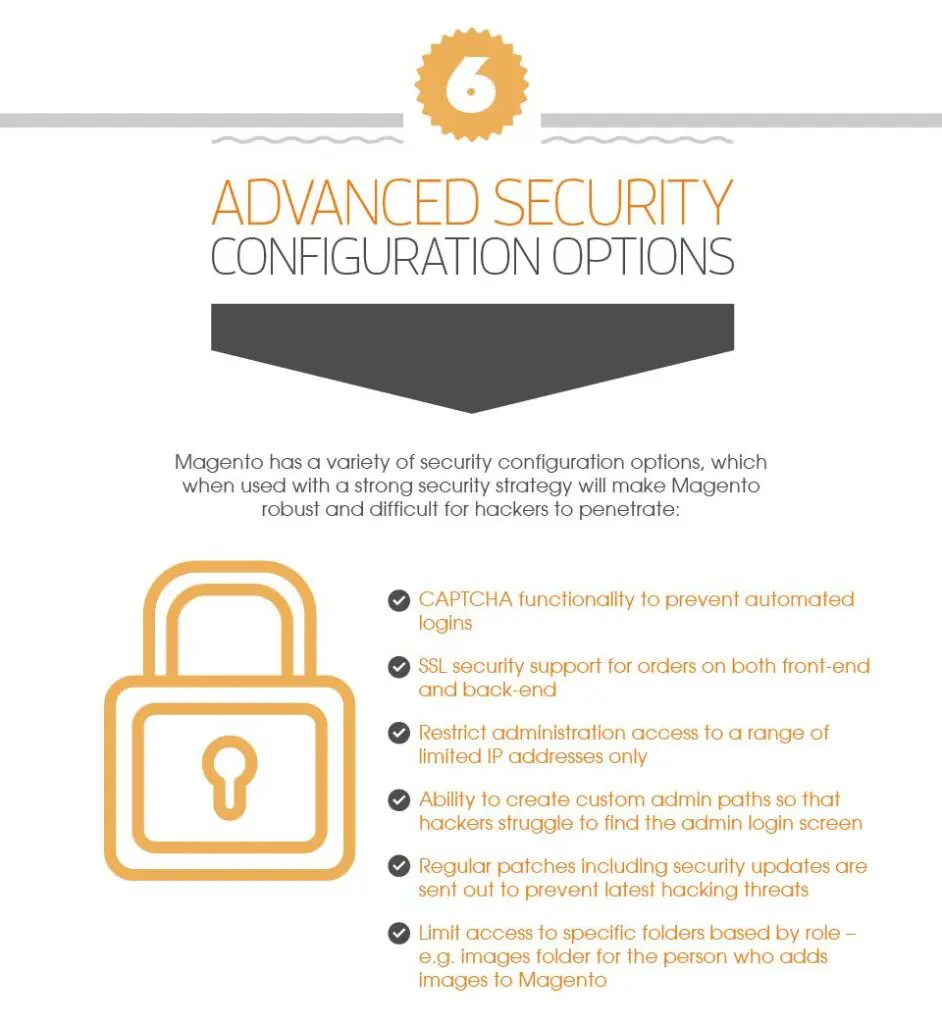
Scalability
Whether you’re managing a small catalog of fifty products or scaling up to thousands, Magento delivers consistent performance without compromising on speed or functionality.
Unlike many other platforms, Magento can grow alongside your business, handling increased traffic, larger product inventories, and more complex operations with ease.
Security
Magento places a strong emphasis on security, offering robust features like regular security patches, two-factor authentication (2FA), and compliance with industry standards such as PCI DSS.
With Adobe’s ongoing updates and a global community of developers, Magento ensures your eCommerce site stays protected from vulnerabilities. For businesses looking to enhance security even further, Magento allows integration with advanced third-party security solutions.
For businesses experiencing rapid growth, Magento also offers the option to move to Adobe Commerce, the enterprise version of the platform. Adobe Commerce provides even greater scalability, advanced features, and enterprise-grade security for larger operations. For pricing and details, submit an enquiry to Adobe here: Adobe Commerce Pricing.
With its unmatched scalability and robust security, Magento remains one of the best eCommerce platforms for businesses of any size.
Seamless integrations with third-party tools
One of Magento’s standout features is its ability to integrate seamlessly with a wide range of third-party services, giving you the flexibility to enhance your eCommerce operations.
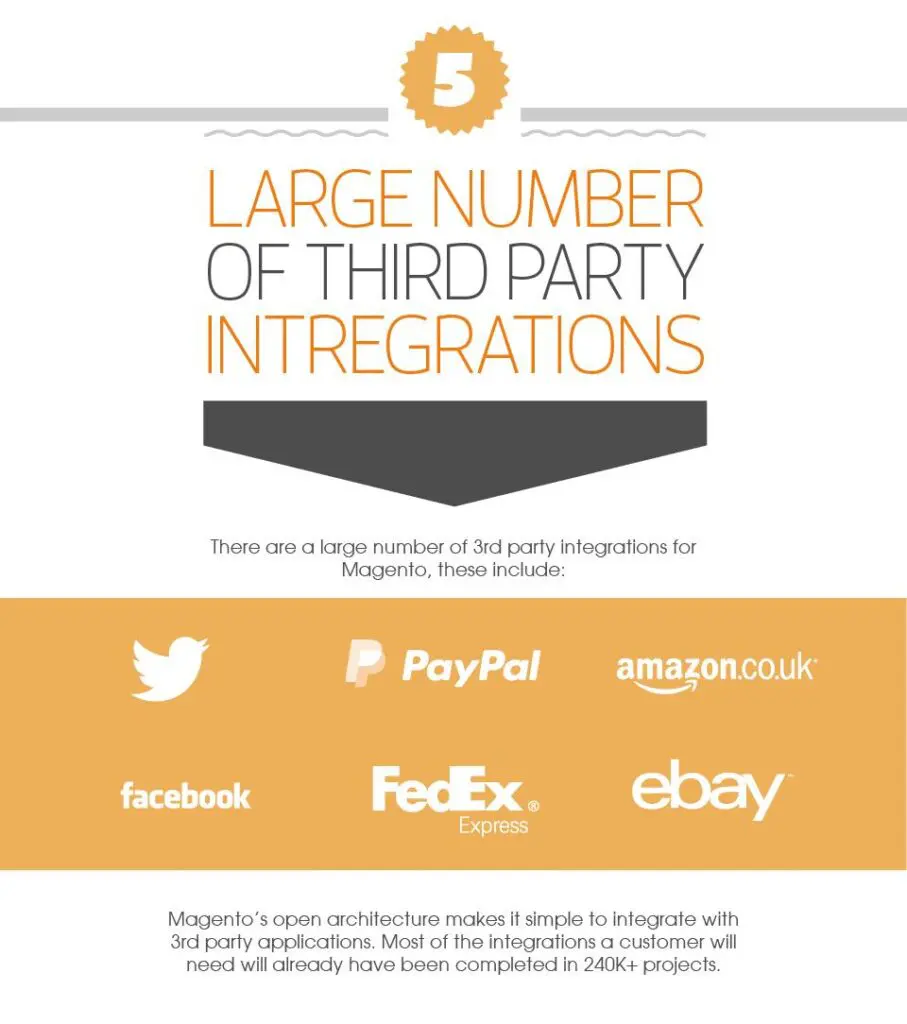
- Payment Gateways: Easily integrate with popular payment processors like PayPal, Stripe, and Authorize.net to offer secure and convenient payment options for your customers.
- Shipping & Logistics: Magento supports integrations with shipping providers like FedEx, UPS, DHL, and USPS, enabling real-time shipping rates, tracking, and streamlined order fulfilment.
- Marketplaces: Expand your reach by connecting your store to platforms like eBay and Amazon. These integrations allow you to sync inventory, orders, and pricing effortlessly.
- Marketing & Analytics: Tools like Google Analytics, Mailchimp, and HubSpot can be integrated with Magento to improve your marketing campaigns and track performance in detail.
- ERP & CRM Systems: Magento is compatible with leading ERP (Enterprise Resource Planning) and CRM (Customer Relationship Management) software, such as SAP, Microsoft Dynamics, and Salesforce, ensuring smooth backend operations and better customer management.
With thousands of modules and APIs available, Magento makes it easy to customise your store and integrate with virtually any service you need. These integrations help streamline your operations, improve customer experience, and scale your business effectively.
Themes, PWAs and responsive design
Magento provides a massive range of themes that allow you to customise the look and feel of your eCommerce store to match your brand. These themes are designed to be responsive, ensuring your website looks and performs beautifully on desktops, tablets, and smartphones.
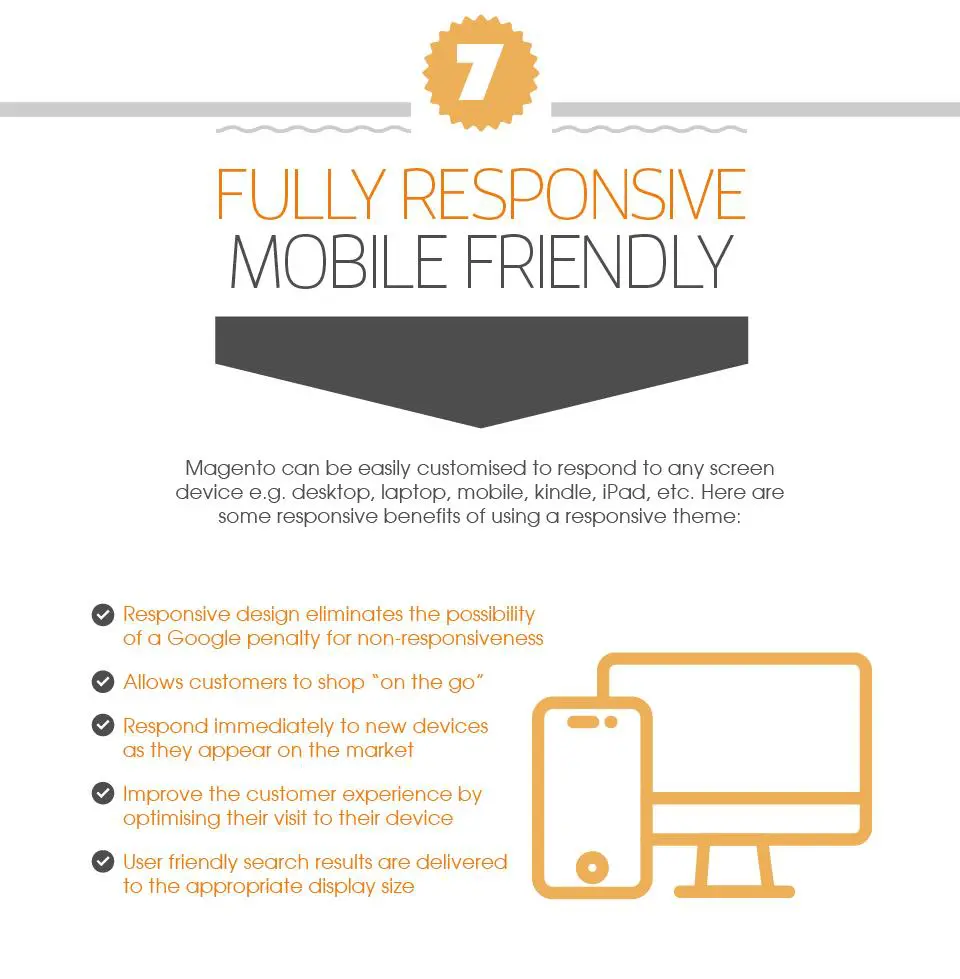
In 2024, Magento has gone beyond traditional responsive design with robust support for Progressive Web Applications (PWA). PWAs combine the best of websites and mobile apps, offering faster load times, offline functionality, and app-like experiences. Whether customers are shopping on their phones or desktops, Magento PWAs ensure flawless performance across all devices. This forward-thinking capability makes Magento one of the most future-proof platforms for modern eCommerce businesses.
Multi-store and multi-language capabilities
Magento excels in handling complex eCommerce setups, making it an ideal platform for businesses operating in multiple markets or regions.
- Multi-Store Management: With Magento, you can manage multiple stores from a single admin panel. Whether you’re running different brands, regional variations, or specialised product lines, Magento allows you to oversee everything in one place, saving time and effort.
- Multi-Language Support: Magento natively supports multiple languages, allowing you to create localised shopping experiences for global customers. You can easily translate product descriptions, categories, and content to ensure your site resonates with audiences worldwide.
- Multi-Currency Support: Magento enables seamless integration of multiple currencies, automatically converting prices based on location or user preferences. This ensures a smooth shopping experience for international customers.
- Customisable Storefronts: Each store can have its own design, product catalog, and pricing structure, making it easy to tailor your approach to different audiences while maintaining consistent backend management.
- Tax and Compliance Management: Magento simplifies handling region-specific taxes, VAT, and compliance requirements, which is crucial when operating in multiple countries.
Whether you’re catering to different regions, languages, or customer bases, Magento’s multi-handling capabilities make it easy to run a global eCommerce operation with efficiency and precision.
It’s used by all the top websites
One of the ways you can tell Magento is the best free eCommerce platform is by the other businesses that use it.
As of 2024, Magento powers over 250,000 websites worldwide, including prominent brands such as Nike, Olympus, and Ford, solidifying its status as a leading eCommerce platform.
In the United States, Magento holds a 12% share among the top 100,000 eCommerce sites, reflecting its strong presence in the market (source MGT Commerce).
Globally, Magento accounts for approximately 0.6% of all websites, underscoring its significant role in the eCommerce industry.
Cost effective for all businesses
While Magento Open Source is free to download, businesses should be aware of hosting, development, and extension costs. Adobe Commerce, the premium edition, includes enterprise-grade features but starts at a higher price point, making it a better fit for larger businesses.
Reputation for excellence
Magento has a reputation for excellence. That’s why as of November 2024, Magento is utilised by 0.6% of all websites whose content management system is known (Source W3Techs) and 2.01% share in the eCommerce market, ranking fourth after WooCommerce, Shopify, and Oracle Commerce (Source 6sense).
Magento is an eCommerce platform that people trust. Along with excellent features, it offers great security solutions that give both businesses and consumers peace of mind.
Customers know that if they’re buying from a Magento site, they can expect quality.
A Visual Magento Guide for Beginners

Magento Open Source Support
Newer Innovations: Hyvä and Mage-OS
The Magento ecosystem has evolved significantly with modern additions like Hyvä Themes and Mage-OS.
Hyvä Themes have redefined front-end development for Magento stores, offering faster performance and better Core Web Vitals scores, which is crucial for SEO and user experience.
Mage-OS, a community-driven fork of Magento, ensures continued innovation and sustainability for Magento Open Source users, addressing concerns raised since Adobe’s acquisition of the platform.
Wrapping up: is Magento the best platform for eCommerce?
Magento continues to prove it is one of the most trusted platforms for online businesses in 2024.
Whether you’re just starting out or managing a global eCommerce operation, this Magento guide for beginners has highlighted the features and tools that make Magento the best eCommerce platform for businesses of all sizes.
From the flexibility of Magento Open Source to the enterprise-level capabilities of Adobe Commerce, Magento remains unmatched in customizability, scalability, and performance.
With industry-leading features for eCommerce SEO, advanced marketing integrations, and endless possibilities through thousands of extensions, Magento ensures your store is built for growth. Its ability to adapt to evolving needs—whether through Hyvä Themes, Mage-OS, or Adobe Commerce Cloud—reinforces its reputation as a forward-thinking platform for modern businesses.
If you’re still wondering why Magento is the best choice, the answer lies in its ability to deliver exceptional results for merchants and customers alike.
With so many amazing features and benefits, it is not hard to see why Magento is the best free eCommerce platform. Ready to build or improve your store? Reach out to our team for expert advice on designing, developing, and optimising your Magento site by getting in touch today.

A selection of our older posts, written by various members of the team between 2015 to 2021.


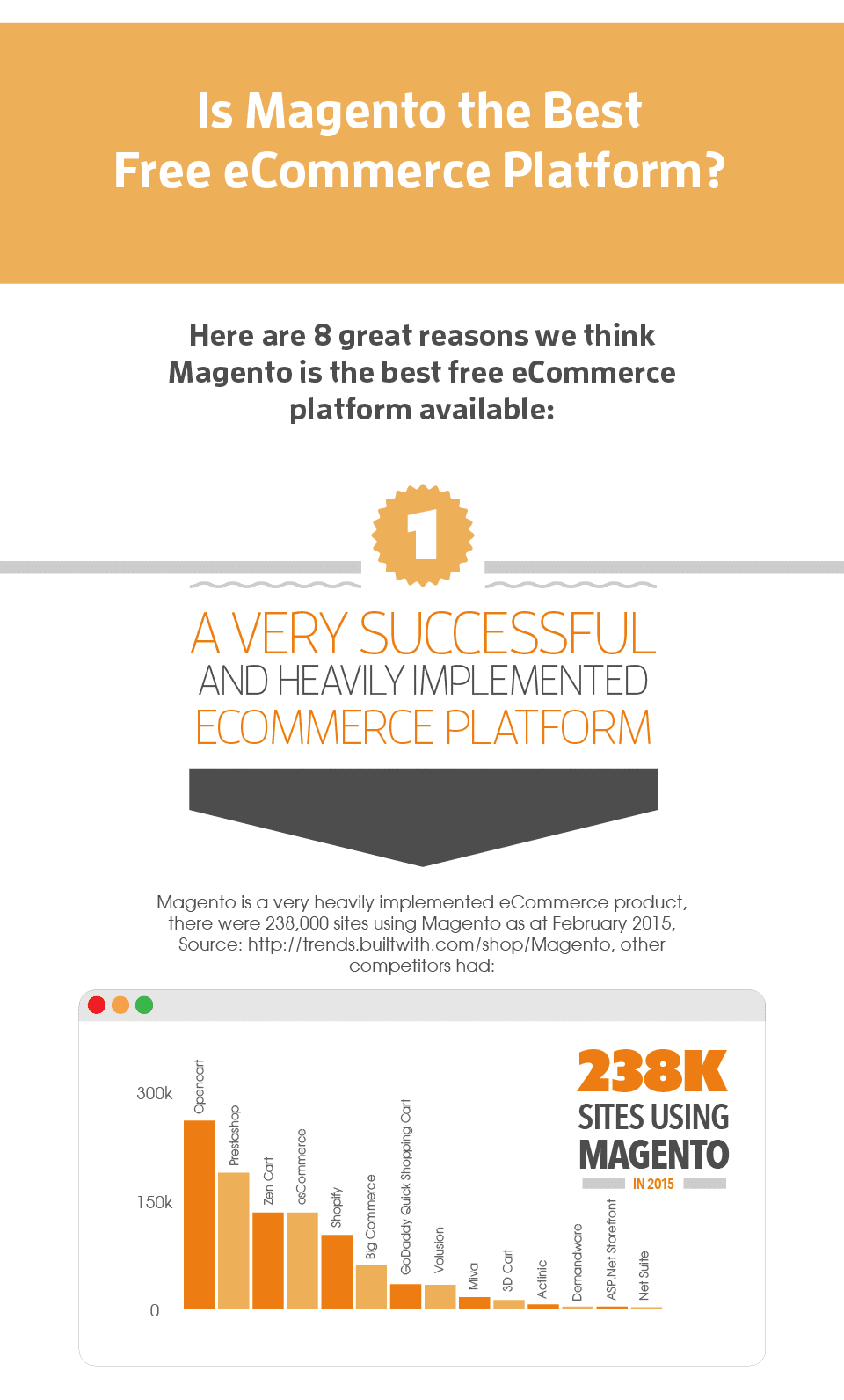
0 Comments